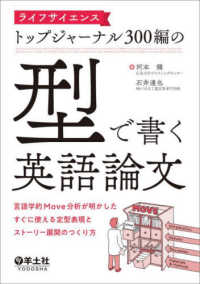- ホーム
- > 洋書
- > ドイツ書
- > Mathematics, Sciences & Technology
- > Earth Science
Full Description
This book combines didactic approaches for increasing climate protection literacy, the health impacts of climate change, and adaptation strategies in various fields. It offers concrete examples and practical methods for actively involving educational institutions, especially universities, schools, and healthcare stakeholders and institutions, in combating the climate crisis. The book is particularly suitable for teachers, students, and professionals who want to actively advance the implementation of Sustainable Development Goal 13 (SDG).
Contents
Problem- and project-based learning: Strategies for integrating SDG 13 into an academic context.- Climate knowledge and strategies for climate action in healthcare - a peer-to-peer module for university teaching.- Activating climate protection measures in schools: The Planetary Health Diet and Mobility Challenge as an intervention example.- Making climate change tangible: Developing an interactive simulation game for managers.- Effectively initiating and managing climate protection measures at universities: A practical example of the KlimaPlanReal transformation project.- Climate protection measures and a culture of sustainability at universities - principles and examples of successful transformation approaches.- On the path to climate neutrality: Establishing a sustainability community at the University of Passau.- Climate action as a challenge in interdisciplinary university teaching.- Why do we (not) change our behavior? Opportunities and limitations of behavior change with regard to climate change.- Footprint and handprint: Social practices for individual and collective climate protection as a contribution to SDG13.- Impacts of climate change on human health: An overview.- Influence of climate change on the mental health of students in Hamburg.- Strengthening resilience at the macro, meso, and micro levels: Planetary Health and One Health as integrative frameworks.- Transformative education for people in health professions in the context of Planetary Health.- SDG 13 meets SDG 3 in teaching: Developing health-related climate literacy in health and nursing management training.- Climate consultation in medical studies: Linking theory and practice.- Environmental physiotherapy - on the path to climate-competent physiotherapists: Didactic and methodological implementation in the physiotherapy program at the Carinthia University of Applied Sciences.- For a healthcare system within planetary boundaries: Experiences from the ErgoLogoPhysio working group by Health for Future/KLUG.- Planetary Health: Urology and Life Cycle Assessment using the example of a life cycle analysis of disposable and reusable ureterorenoscopes and their impact on health.- Insurance against natural hazards and the need for responsibility sharing.- Transformative education for people in healthcare professions in the context of Planetary Health.- Climate consultation in medical studies: Linking theory and practice.- Transformative education for people in healthcare professions in the context of Planetary Health.- Urban climate assessment for heat action plans.- Neighborhood & Us - Practical impulse for the construction transition: The socially, climate-, and environmentally friendly transformation of the construction industry.- Participatory approaches to climate change and adaptation in cities.- Development of climate protection and climate adaptation measures of the Free and Hanseatic City of Hamburg from 1997 to 2023.- Carbon footprints in sustainability reporting: Transparent and comprehensible greenhouse gas balances as a first step in reducing emissions.- Climate-friendly Energy supply at universities: Minimizing greenhouse gas emissions across the entire life cycle while taking costs into account.- The chameleon natural gas/methane - important for energy supply but also dangerous for the climate.- Sustainability and climate protection in the social economy.- The role of non-governmental organizations (NGOs) as catalysts for CSR measures for climate action using the example of TAISE.
-

- 電子書籍
- これってハラスメントですか? 分冊版 …
-

- 電子書籍
- 海皇紀(27)






